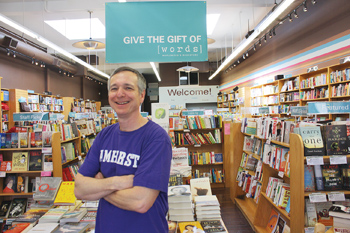By Katherine Duke ’05
Photos courtesy of [words] bookstore
[Small business] In an era when many neighborhood bookstores are closing down, [words] in Maplewood, N.J.—run by Jonah Zimiles ’79 and his wife, Ellen—has succeeded by opening things up: opening its doors to families of children with autism, and opening up vocational and recreational possibilities for those young people.

In 1998 the Zimiles’ then-3-year-old son, Daniel, was diagnosed with autism. Jonah, a lawyer by training, was director of planned giving and endowments for The Jewish Federations of North America, but coordinating his son’s appointments with doctors, teachers and therapists became so time-consuming that he made it his full-time job. Six years later, as Daniel’s schedule stabilized, Jonah enrolled in business school at Columbia, where he focused on social entrepreneurship, aspiring to raise money for autism research and services and to launch a job training facility for autistic people.
But his plans changed again with the 2008 economic downturn, which struck the New York City suburb of Maplewood hard. Ellen read a sign at the town’s bookstore, Goldfinch, saying the business would shut down unless a local resident could buy it. “This idea flashed into her head,” says Jonah: What if they launched the training program as part of a business? So the Zimileses purchased Goldfinch and moved it to a larger downtown storefront. The new, bracketed name, [words], would “emphasize the double mission of the bookstore: to provide terrific reading for local residents and to assist individuals with autism, many of whom have significant language challenges,” Jonah says.
![14232.jpg Shelves at [words] Bookstore](/system/files/media/14232.jpg)
Today, in addition to the usual bookshop offerings, visitors can find many autism-related books, as well as greeting cards and calendars designed by artists with autism. Extra-wide aisles accommodate kids—autistic and typical—who prefer lots of space to move around. When a family comes in with an autistic child, Zimiles is “like a fireman jumping on the pole,” he says, racing out of his back office to welcome them. The staff has undergone sensitivity training, and, according to Zimiles, two of the permanent employees are on the autism spectrum themselves.
A free event series allows kids with autism and other special needs to sample classes in sewing, karate, yoga and more. A training program has brought in more than 50 teens and young adults with autism to do various jobs around the store, depending upon their skills and interests. In fact, Zimiles has spoken on MSNBC about using the same strategy with typical employees: fitting the job to the person, rather than the person to the job.

The store has earned write-ups in Entrepreneur magazine and Publishers Weekly, and New Jersey Monthly has named it the state’s best independent bookstore. It’s attracted such speakers as former New York Gov. Mario Cuomo. Many Amherst authors have done readings there, and Maplewood neighbor David Schwab ’79 sometimes drops by.

Sales have increased by 10 percent to 20 percent every year, Zimiles says, but he downplays the financial success. “That’s not really what we’re about,” he says. “It’s really a social enterprise.”
Duke is the assistant editor of Amherst magazine.